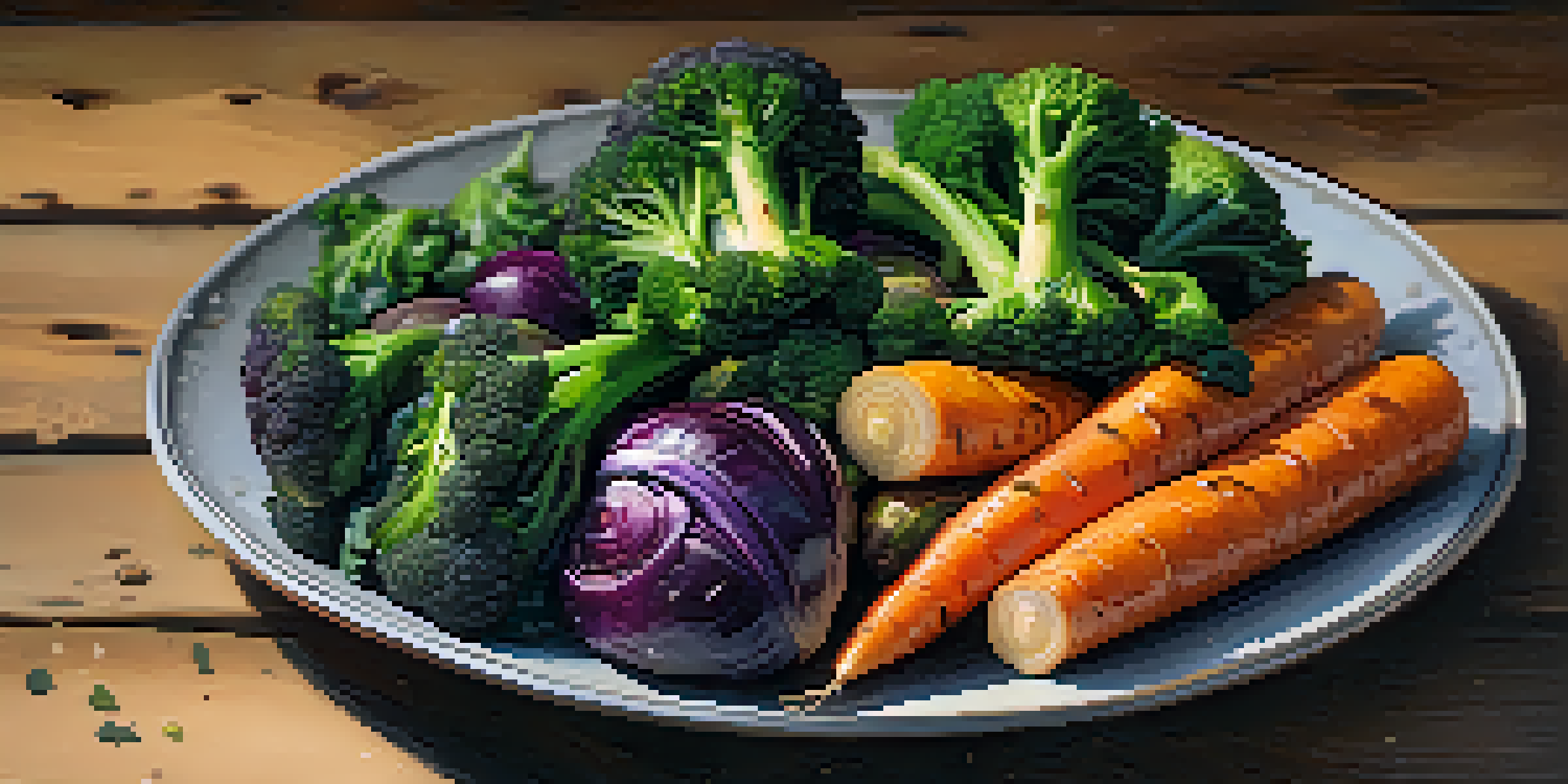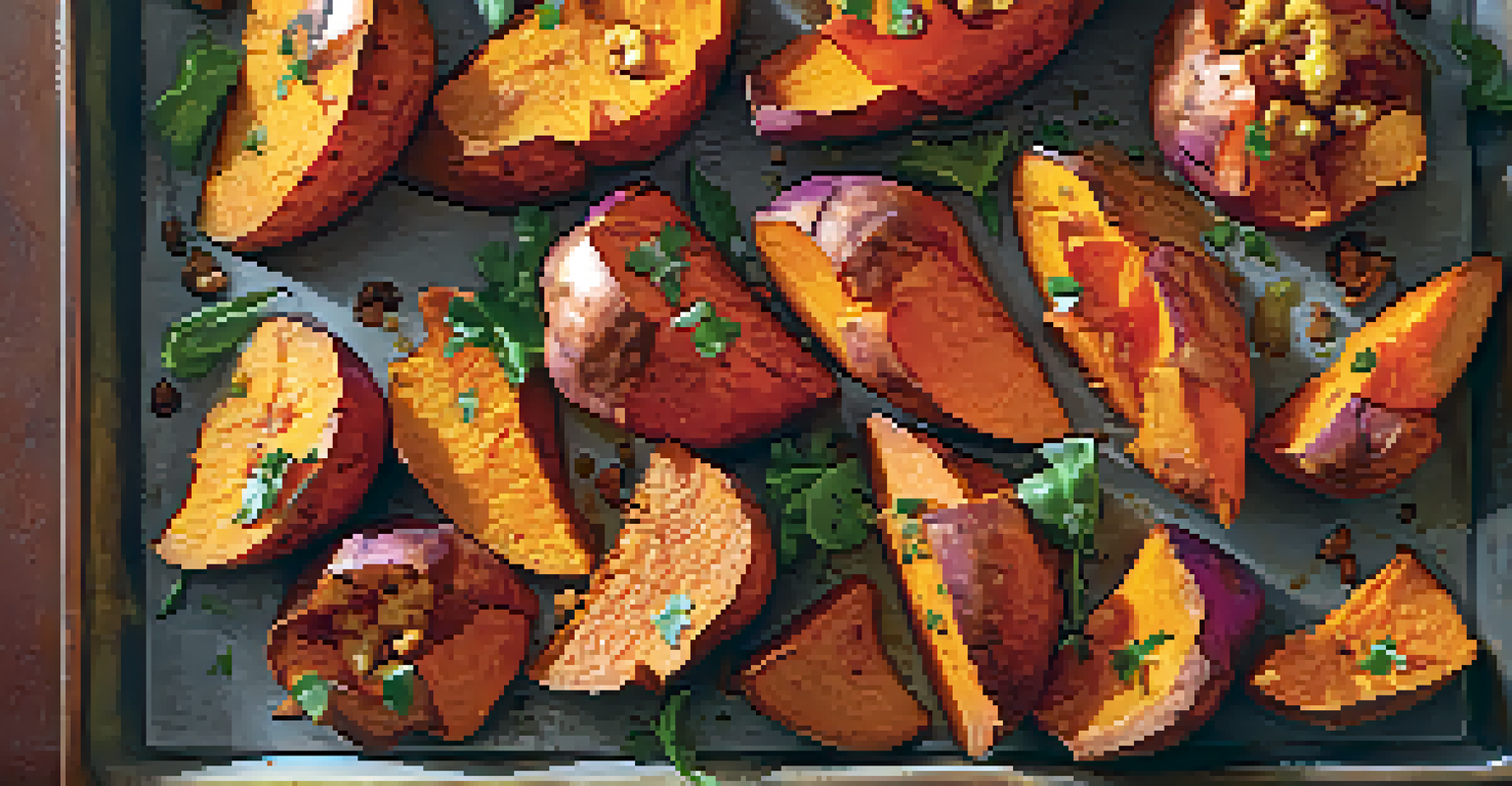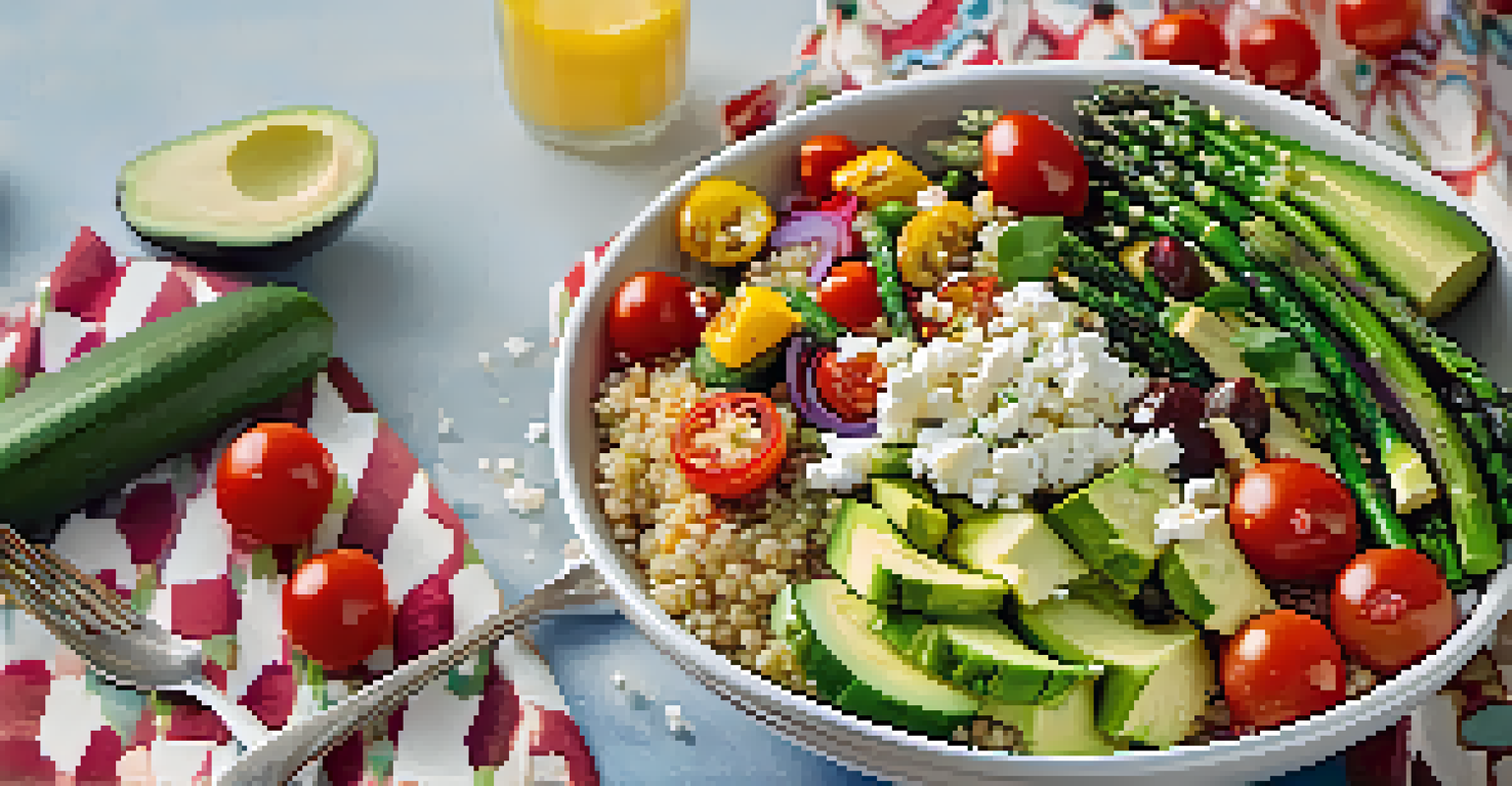Roasting Vegetables: A Flavorful Way to Cook Healthily

Why Roasting Vegetables is a Healthy Cooking Method
Roasting vegetables is not only a delicious way to prepare your meals, but it's also incredibly healthy. The high heat helps to caramelize the natural sugars in veggies, enhancing their flavors without the need for excessive oils or fats. This method retains essential nutrients while allowing you to enjoy the natural taste of the vegetables.
Eating vegetables is a great way to get vitamins and minerals, but roasting them brings out their natural sweetness and flavors.
Furthermore, roasting can transform even the most mundane vegetables into mouthwatering treats. Think about how a humble carrot or a simple broccoli floret can become a standout dish when roasted. This encourages you to incorporate more veggies into your diet, making healthy eating feel less like a chore.
Plus, the roasting process creates a delightful texture contrast, with crispy exteriors and tender interiors. This makes each bite satisfying, encouraging you to savor and enjoy your vegetables rather than simply consuming them for their nutritional benefits.
Choosing the Right Vegetables for Roasting
Not all vegetables roast equally well, so it's important to choose the right ones for the best results. Root vegetables like carrots, potatoes, and sweet potatoes are excellent choices due to their natural sweetness and sturdy texture. They hold up well to high heat and can develop a lovely caramelization.

Other great options include bell peppers, Brussels sprouts, and cauliflower. These vegetables add color and flavor variety to your plate. When selecting veggies, aim for a mix of textures and tastes to keep things interesting. Trying different combinations can lead to delightful surprises in flavor.
Roasting Enhances Vegetable Flavor
Roasting vegetables caramelizes their natural sugars, enhancing flavors while retaining essential nutrients.
It’s also worth noting that seasonal vegetables often taste best when roasted. For instance, in the fall, squash and beets shine, while asparagus and zucchini are fantastic in the spring. Embracing seasonal produce not only enhances flavor but also supports local farmers and reduces your carbon footprint.
The Best Techniques for Roasting Vegetables
To get started with roasting, it's vital to cut your vegetables into uniform sizes. This ensures that everything cooks evenly, preventing some pieces from burning while others remain undercooked. Aim for bite-sized pieces that will roast in about 20 to 30 minutes at a high temperature, usually around 400 to 425 degrees Fahrenheit.
The beauty of roasted vegetables is that they can be a flavorful addition to nearly any dish, enhancing both taste and nutrition.
Don't forget to coat your veggies with a little oil and seasoning before roasting. A drizzle of olive oil, salt, and pepper goes a long way. For extra flavor, consider adding herbs and spices like garlic powder, rosemary, or paprika. This step enhances the natural taste and gives your dish a gourmet touch.
Lastly, give your vegetables plenty of space on the baking sheet. Overcrowding can lead to steaming rather than roasting, which will result in soggy vegetables. If you're making a large batch, use multiple sheets or roast in two batches to achieve that perfect golden-brown finish.
Experimenting with Flavor Combinations
One of the most enjoyable aspects of roasting vegetables is the opportunity to experiment with various flavor combinations. You can pair different vegetables together that complement each other, like sweet potatoes with Brussels sprouts or carrots with onions. These combinations can elevate your dish and make it more exciting.
Additionally, consider adding different marinades or glazes before roasting. A splash of balsamic vinegar, a sprinkle of cheese, or a touch of honey can create a unique flavor profile. Don't hesitate to get creative with your favorite seasonings; the possibilities are virtually endless.
Choose the Right Veggies for Roasting
Selecting sturdy root vegetables and seasonal produce ensures the best results when roasting.
You can also switch up your cooking method by mixing roasted vegetables with grains or proteins. Toss roasted veggies into a salad, serve them alongside grilled chicken, or mix them into a grain bowl for a well-rounded meal. This versatility makes roasted vegetables a staple in any healthy diet.
How to Store and Reheat Roasted Vegetables
If you find yourself with leftovers after a delicious roasted vegetable meal, you're in luck! Roasted veggies store well in the refrigerator and can be easily reheated. Just place them in an airtight container and they can last for up to four days. This makes them a perfect option for meal prep.
When it comes to reheating, the oven is your best friend. Preheat it to about 350 degrees Fahrenheit, spread the vegetables on a baking sheet, and warm them for about 10-15 minutes. This method helps maintain that crispy texture, unlike microwaving, which can make them soggy.
If you want to add a little freshness to your reheated veggies, consider tossing in some fresh herbs or a squeeze of lemon juice just before serving. This simple touch can brighten the flavors and make them feel just as good as when they were first made.
Pairing Roasted Vegetables with Other Dishes
Roasted vegetables can be a fantastic accompaniment to a variety of dishes. They pair beautifully with proteins like grilled chicken, fish, or plant-based options like tofu. The rich flavors of roasted veggies can elevate a simple meal into something special, making your plate visually appealing and nutritionally balanced.
You can also use roasted vegetables as a flavorful addition to pasta dishes, grain bowls, or even on top of pizzas. Their versatility means they can fit into any meal, seamlessly blending with different cuisines and ingredients. This adaptability makes it easier to incorporate more veggies into your diet.
Roasted Veggies Boost Health Benefits
Incorporating a variety of roasted vegetables into your diet supports overall health through essential vitamins and fiber.
Don't forget about using roasted vegetables in salads. They add a warm, hearty element that can transform a cold salad into a comforting dish. Mix them with leafy greens, nuts, and a light vinaigrette for a satisfying meal that's both nutritious and delicious.
Health Benefits of Incorporating Roasted Vegetables
Incorporating roasted vegetables into your diet comes with a host of health benefits. Vegetables are packed with essential vitamins, minerals, and antioxidants that support your overall health. Roasting helps to retain these nutrients, ensuring you can enjoy the maximum health benefits from your veggies.
Eating a variety of vegetables can also contribute to better digestion, weight management, and improved heart health. The fiber found in vegetables aids digestion and helps you feel fuller longer, which can be a key factor in maintaining a healthy weight.

Moreover, different vegetables offer unique health benefits. For example, leafy greens like kale are rich in iron, while carrots provide a healthy dose of beta-carotene. By roasting a colorful variety of vegetables, you can ensure your meals are not only tasty but also packed with nutrients that support your well-being.